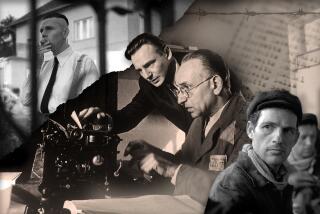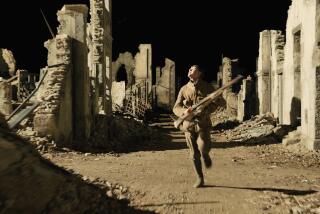Epic ‘Stalingrad’ Captures Carnage, Horrors of War
- Share via
It’s not even a name on the map anymore, having been called Volgograd since 1961, but a half century ago “Stalingrad” was a place no one could ignore.
Between September 1942 and February 1943, this city in the former Soviet Union was the site of a landmark in military history, a brutal battle between German and Russian troops that ended with a million dead and turned the tide of World War II against the Nazi war machine.
Made in Germany to commemorate the 50th anniversary of that action, “Stalingrad” is an expertly crafted epic war movie, a two-hour-and-15 minute immersion in the horrors of combat so grueling you can practically smell the stench of death.
In broad outline “Stalingrad” is very much a traditional battlefield saga, complete with its focus on a few men in a single platoon and the inclusion of such standard features as grousing about food and a “Dear John” letter from home.
But, coming from the producers of “Das Boot,” “Stalingrad” also believes in being realistic to the point of becoming an antiwar war movie, one that emphasizes the complete futility of heroism and the stupidity of sacrificing endless human lives in pointless maneuvers.
And director Joseph Vilsmaier, working from a script he wrote with Johannes Heide and Jurhen Buscher, does not shy away from a sympathetic portrayal of the Russians or from showing Germans behaving with barbarism as well as heroism, both toward the enemy and each other.
*
The most impressive aspect of “Stalingrad” is its scope. Made for $20 million, a considerable budget by European standards, the film has spent most of its money carefully re-creating hellish scenes of battlefield destruction and displaying them on color film (also shot by Vilsmaier) muted to look like vintage footage.
The carnage takes place in two very different locales. At first the Germans and Russians engage in hand-to-hand and house-to-house fighting in a rabbit warren of sewers and bombed-out buildings. Then the scene shifts to the barren outskirts of the city, where burning tanks in the snow form an eerie backdrop to the continual slaughter.
“Stalingrad’s” interest in reality means it does not stint on the graphic aspects of battle. Scenes of gaping wounds, of a man blown in half and rats feasting on corpses make this one epic the squeamish might want to stay away from.
Our companions on this tour of battlefield hell are three easily recognizable war movie types. In command is Lt. Hans Von Witzland (Thomas Kreischmann), an untested and idealistic young aristocrat. Just the opposite is his most experienced NCO, crusty Manfred “Rollo” Rohleder (Jochen Nickel). And rounding out the group is cheerful corporal Fritz Reiser (Dominique Horwitz), notable for his big ears and sensible attitude.
None of these actors is known to American audiences, and that unfamiliarity, plus the use of situations we rarely see--like German soldiers rioting to be on the last plane out of Stalingrad--add to this film’s feeling of verisimilitude. Though the dialogue and situations are standard at times, the film’s ability to re-create the complete disintegration of a formidable fighting machine is impressive.
* Unrated. Times guidelines: considerable and graphic battlefield carnage.
(BEGIN TEXT OF INFOBOX / INFOGRAPHIC)
‘Stalingrad’
Thomas Kreischmann: Hans Von Witzland
Jochen Nickel: Manfred “Rollo” Rohleder
Dominique Horwitz: Fritz Reiser
Sebastian Rudolph: Gege
Sylvester Groth: Otto
Dieter Okras: Haller
Karel Hermanek: Musk
Dava Vavrova: Irina
A co-production of Bavaria Studios in association with Royale/Senator Films and Perathon, released by Strand Releasing. Director Joseph Vilsmaier. Producers Gunther Rohrbach, Hanno Huth, Joseph Vilsmaier. Executive producers Mark Damon, Michael Krohne. Screenplay Johanns Heide, Jurhen Buscher, Joseph Vilsmaier. Cinematographer Joseph Vilsmaier. Editor Hanno Nikel. Production design Wolfgang Hundhammer, Jindrich Goetz. Running time: 2 hours, 15 minutes.
* Exclusively at Music Hall, 9036 Wilshire Blvd., Beverly Hills, (310) 274-6869.
More to Read
Only good movies
Get the Indie Focus newsletter, Mark Olsen's weekly guide to the world of cinema.
You may occasionally receive promotional content from the Los Angeles Times.











